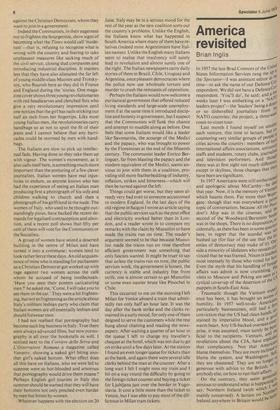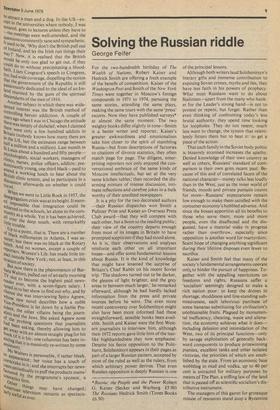America revisited
Brian Inglis In 1957 the late Brad Connors of the United, States Information Services rang Me UP the Spectator—I was assistant editor at the time—to ask the name of our Defence CO respondent. We did not have a Defence CtIr respondent. 'You'll do', he said; and a weeks later I was embarking on a leaders project'—the 'leaders' being a di:0, or so dishevelled journalists from tui: NATO countries; the project, a threecoast-to-coast tour. Last month I found myself on another such venture, this time to lecture, but countering very similar groups of peoPle cities across the country : members of loco international affairs associations, un1vellit,Y5 staffs and students, rotary clubs, journalts;, and television performers. And thoug' there was at first sight not much difference; except in skylines, those changes that ther
have been are significant. ed
In 1957 Americans were still embarrass.61 and apologetic about McCarthy—be ut that year. Now, it is the memory of Viettlar, which haunts them. Far more than Wa,t.,,,et gate: though that was everywhere a P1'i".1, topic of conversation, because All the Ple dent's Men was in the cinemas, and to second of the Woodward/Bernstein b°°.,,, was in the shops. There is no disposition, l';. cidentally, as there has been in some cluart,f'ot here, to regret that the scandal was hushed up (for fear of the use that the ev emies of democracy may make of it). side a minority of idolaters who remain c°,,d, vinced that he was framed, Nixon is loatb„,,, most intensely by those who voted for hro Even the myth that his handling of foreolgis affairs was adroit is now crumbling' visits to Moscow and Peking are seen 3,15 cynical cover-up of the desertion of the puppets in South-East Asia. vneri' Traumatic though the Vietnam e-r of ence has been, it has brought an access.,s. humility. In 1957 well-to-do Amerlear"ot particularly businessmen,, still had a fi conviction that the US had clean hands' tioo stained by imperialist blood, and a g°er. warm heart. Any US-backed overseas One, prise, it was assumed, must surely be the ficial to the recipients. Vietnam, arl;'cied revelations about the CIA, have ex'Pwans that complacency. Not that Americo° blame themselves. They are more inclillectio. blame the system, and Washingtofl. so they are chastened. They are no longer to generous with advice to the British, °r anybody else, on how to run their affariely On the contrary, they seem geri,u1, anxious to understand what is haPPelli,ri'ps say, Northern Ireland (with which hero mainly concerned). A lecture on Sdrit,,co' Ireland anywhere in Britain would be' to attract a man and a dog. In the US—except in the universities where nobody, I was assured, goes to lectures unless they have to —the meetings were well-attended, and the questions consistently sane and sympathetic. It used to be, 'Why don't the British pull out of Ireland, and let the Irish run things their way?' Now, it is realised that the British would be only too glad to get out, if they Could do so without precipitating a bloodbath. Liam Cosgrave's speech to Congress, too, had wide coverage, dispelling the notion that the government of the Republic is still ,Passionately dedicated to the ideal of an Ireland reunited by the guns of the spiritual descendants of the men of 1916. Another subject in which there was widespread interest was the British method of controlling heroin addiction. A couple of ,Years ago when 1 was in Chicago the attitude "lere was simply of disbelief, when I claimed the.re were only a few hundred addicts in 11. main the Us, knows how many there are tne US, but the estimates range between "alla million and a million). Last month in st Louis about a hundred and fifty peoplePsYehologists, social workers, managers of edcs, nurses, police officers, addicts: pre°IninantlY young, one third black—paid to tend a working lunch to hear about the e 6.sh clinic system, and to participate in a travel. lseussion afterwards on whether it could d When we went to Little Rock in 1957, the edesegregation crisis was at its height. It seem 4. lniPossible that integration could be chieved in the schools, let alone in the cornarn..unity as a whole. Yet it has been achieved, over the deep south, with remarkably lit Over
trouble.
()cup to a point, that is. There are a number s„ black millionaires in Atlanta, I was aslu'redthere was no black at the Rotary r lIcb. And no women, except a couple of ePorters. Women's Lib. has made little im!aet outside New York ; not, at least, in this waturn of society.
b now there is the phenomenon of Bar
IV now there pulled out of an early morning rle slot to become the highest paid newstuand,,e,r, ever, with a seven-figure salary. I ch.' In to her show to find out why, and by vv"hanee she was interviewing Spiro Agnew, vi °se new novel describes how a noble 4 _.President is let down by a feeble Prealitl eo, the other villains being the journ0f.sts and the Jews. She asked Agnew none bvtbe probing questions that journalists get' been asking, thereby allowing him to bo_a,vvaY vvith an almost straight plug for his sivu1( (if it iS his: one columnist has been ina„ ',tug that it is massively re-written by some 'ststant). Ms in aiveWalters is personable, if rather bleak, bcirnerarance; her voice has a touch of casts ake in it; and she interrupts her news-. Periodically to puff the products manu'vrured b cos . Y the programme's sponsor, a rrietics frm °tiler • Anle...c things may have changed; tar,. an television remains as spectacuV awful as ever.



































 Previous page
Previous page